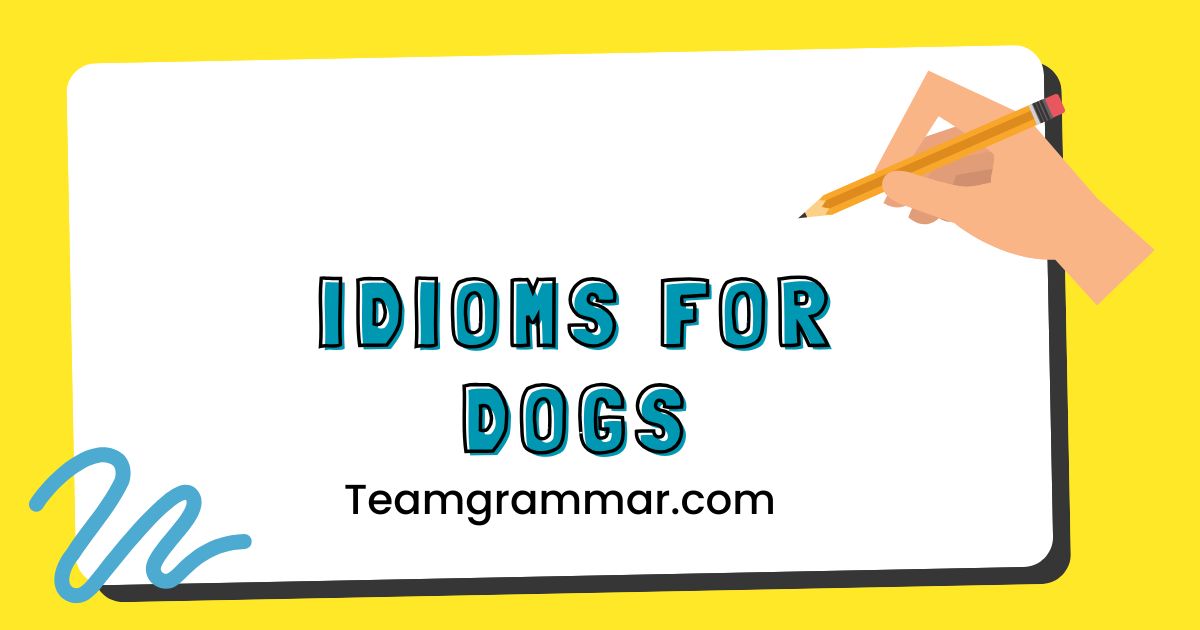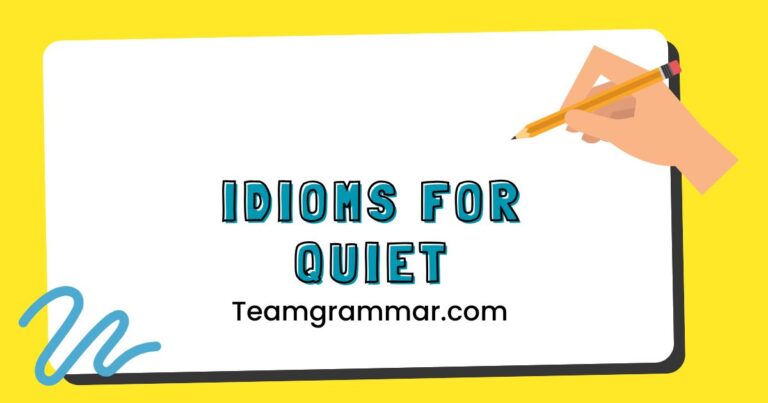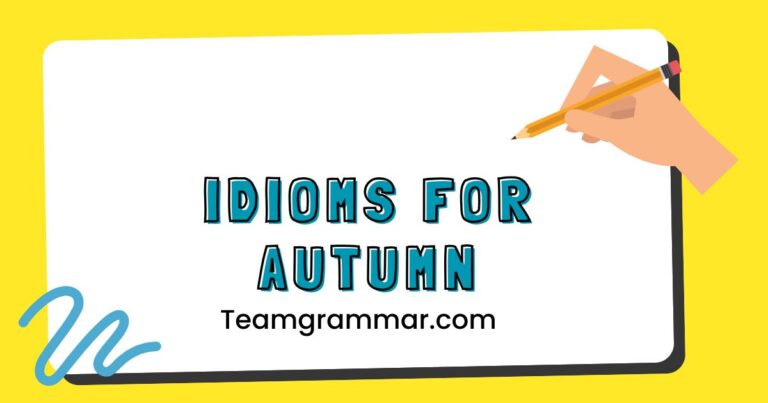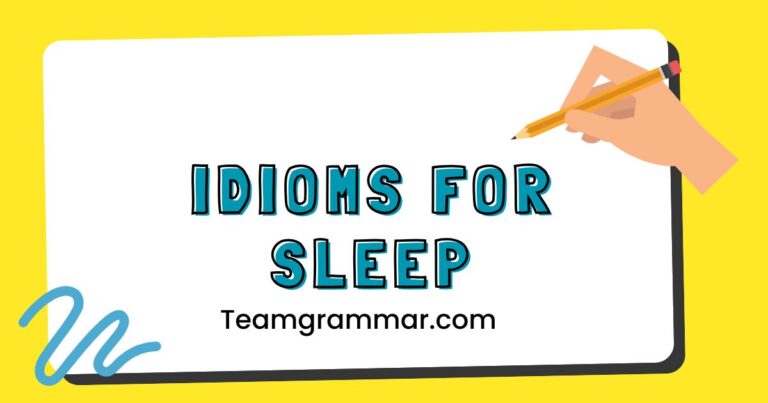33 Idioms for Dogs: Understanding Canine-Related English Expressions
Understanding idioms is crucial for mastering English, as they add color and nuance to everyday communication. Idioms related to dogs are particularly common and offer insights into cultural perceptions of these animals.
This article explores the diverse range of dog-related idioms, their meanings, origins, and usage. It is designed for English language learners, teachers, and anyone interested in enriching their understanding of idiomatic expressions.
Table of Contents
- Introduction
- Definition of Idioms for Dogs
- Structural Breakdown
- Types and Categories of Dog Idioms
- Examples of Dog Idioms
- Usage Rules for Dog Idioms
- Common Mistakes with Dog Idioms
- Practice Exercises
- Advanced Topics: The Etymology of Dog Idioms
- FAQ: Frequently Asked Questions
- Conclusion
Definition of Idioms for Dogs
An idiom is a phrase or expression whose meaning cannot be understood from the literal meanings of its individual words. Instead, the phrase has a figurative meaning that is known through common usage.
Dog-related idioms are those that use the word “dog” or reference canine characteristics to convey a specific meaning. These idioms often reflect cultural attitudes toward dogs, both positive and negative.
Idioms function as a type of figurative language, adding depth and color to communication. They are often used to express complex ideas in a concise and memorable way.
Understanding idioms is crucial for comprehending spoken and written English, as they are frequently used in everyday conversations, literature, and media. Dog idioms, in particular, offer insights into how dogs are perceived in different cultures and contexts.
The context in which an idiom is used is vital for understanding its meaning. For example, the idiom “every dog has its day” suggests that everyone will have a moment of success or good fortune eventually.
The literal interpretation—that dogs experience days—is irrelevant. The idiom’s true meaning is about eventual success for everyone.
Structural Breakdown
Dog idioms, like other idioms, do not follow standard grammatical rules. Their structure is fixed, meaning the words cannot be changed or reordered without altering or losing the idiom’s meaning.
For instance, you cannot say “every canine has its day” and expect it to convey the same meaning as “every dog has its day.”
The structure of dog idioms can vary. Some are simple phrases, such as “dog days,” while others are more complex sentences, such as “let sleeping dogs lie.” Regardless of their length, the key characteristic is their non-literal meaning.
These idioms often incorporate verbs, nouns, and prepositions in specific arrangements to create their unique figurative meanings.
Understanding the structural elements of idioms involves recognizing that they function as single units of meaning, rather than as combinations of individual words. This means that the entire phrase must be considered as a whole to grasp its intended message.
Therefore, you must learn the entire idiom as a single vocabulary item.
Types and Categories of Dog Idioms
Dog idioms can be categorized based on their connotations and the aspects of dogs they reference. Understanding these categories can help learners better grasp the nuances of each idiom and use them appropriately.
Idioms with Positive Connotations
Some idioms portray dogs in a favorable light, often emphasizing their loyalty, companionship, and helpfulness. These idioms reflect the positive relationships many people have with dogs.
Idioms with Negative Connotations
Other idioms use dogs to represent negative qualities, such as aggression, subservience, or misfortune. These idioms may stem from historical perceptions or specific dog behaviors.
Idioms with Neutral Connotations
Some idioms involving dogs are neither positive nor negative, but simply descriptive or factual. These idioms often relate to everyday situations or common observations about dogs.
Examples of Dog Idioms
The following tables provide a comprehensive list of dog idioms, categorized by their connotations and the aspects of dogs they reference. Each table includes the idiom, its meaning, and example sentences to illustrate its usage.
Table 1: Positive Dog Idioms
This table presents idioms that use dogs in a positive context, highlighting their good qualities or the benefits they bring.
| Idiom | Meaning | Example Sentence |
|---|---|---|
| Man’s best friend | A loyal and trusted companion | Everyone knows that a dog is man’s best friend. |
| A lucky dog | Someone who is very fortunate | He won the lottery; he’s such a lucky dog! |
| Work like a dog | To work very hard | She had to work like a dog to finish the project on time. |
| Every dog has its day | Everyone will have a moment of success or good fortune | Don’t worry; every dog has its day, and your turn will come. |
| Top dog | The leader or most important person | After years of hard work, she finally became top dog in the company. |
| Help a dog out | To assist someone in need | Can you help a dog out with these heavy boxes? |
| As loyal as a dog | Extremely faithful and devoted | He’s as loyal as a dog; you can always count on him. |
| A dog’s life (positive) | A comfortable and pampered existence | With all that money, he’s living a dog’s life. |
| Dog-tired | Extremely tired | After the marathon, I was dog-tired. |
| Like a dog with two tails | Extremely happy or excited | He was like a dog with two tails when he got the promotion. |
| Old dog | A term of endearment for an older person, usually male | Hey, old dog, how are you doing today? |
| To have a dog in the fight | To have a personal stake or interest in something | As a shareholder, I have a dog in this fight and want to see the company succeed. |
| Lead a dog’s life | To have a carefree and enjoyable existence | Since retiring, he’s been leading a dog’s life, traveling and relaxing. |
| Happy as a dog with a bone | Extremely content and satisfied | The child was happy as a dog with a bone when he received the new toy. |
| Dog and pony show | An elaborate presentation or performance, often for show rather than substance | The sales presentation was just a dog and pony show, with no real solutions offered. |
| A dog is a man’s best friend | Dogs are loyal and trustworthy companions to humans | It’s true that a dog is a man’s best friend; they’re always there for you. |
| Dog days of summer | The hottest days of summer | During the dog days of summer, it’s best to stay indoors with air conditioning. |
| Bark is worse than its bite | Someone’s threats or warnings are more frightening than their actual actions | Don’t worry about him; his bark is worse than his bite, he won’t actually do anything. |
| Every dog has his day | Everyone will have a moment of success or good fortune eventually | Even though she’s struggling now, every dog has his day, and she’ll succeed eventually. |
| You can’t teach an old dog new tricks | It is difficult to teach someone new things, especially if they have been doing something a certain way for a long time | He’s been using the same software for years; you can’t teach an old dog new tricks. |
Table 2: Negative Dog Idioms
This table showcases idioms that use dogs in a negative or critical context, highlighting undesirable traits or situations.
| Idiom | Meaning | Example Sentence |
|---|---|---|
| Go to the dogs | To deteriorate or become ruined | Since the new management took over, the company has gone to the dogs. |
| A dog’s breakfast/dinner | A mess or something poorly done | The report was a dog’s breakfast; it was full of errors. |
| Treat someone like a dog | To treat someone badly or unfairly | He treats his employees like dogs, with no respect. |
| Dog-eat-dog | Ruthlessly competitive | The corporate world is dog-eat-dog; you have to fight for everything. |
| In the doghouse | In trouble or out of favor | He’s in the doghouse with his wife after forgetting their anniversary. |
| As sick as a dog | Very ill | I was as sick as a dog yesterday and couldn’t go to work. |
| A dog’s life (negative) | A miserable or difficult existence | Living on the streets is a dog’s life. |
| Die like a dog | To die in a miserable or undignified way | He was left to die like a dog, abandoned and alone. |
| Sweat like a dog | To sweat profusely | I was sweating like a dog after that workout. |
| A cur dog | A despicable or cowardly person | He’s a cur dog for betraying his friends. |
| To be hounded like a dog | To be pursued relentlessly | The journalist was hounded like a dog by the paparazzi. |
| A yellow dog contract | An agreement forbidding employees from joining a union | The company tried to enforce a yellow dog contract, but the workers protested. |
| Barking up the wrong tree | Accusing or pursuing the wrong person or course of action | If you think I’m the one who stole your money, you’re barking up the wrong tree. |
| Run with the hare and hunt with the hounds | To try to please both sides in a conflict | He’s trying to run with the hare and hunt with the hounds, but eventually he’ll have to choose a side. |
| Mad dog | A dangerous or unpredictable person | The dictator was seen as a mad dog by the international community. |
| Dog tired | Extremely exhausted | After working all day, I was absolutely dog tired. |
| Sick as a dog | Feeling very ill | I felt sick as a dog after eating that bad seafood. |
| Go to the dogs | To deteriorate or decline in quality | Since the new management took over, the company has really gone to the dogs. |
| Dog-eat-dog world | A fiercely competitive environment where people are willing to do anything to succeed | The business world can be a dog-eat-dog world, where only the strongest survive. |
| In the dog house | In trouble or out of favor with someone | I’m in the dog house with my wife because I forgot our anniversary. |
Table 3: Neutral Dog Idioms
This table includes idioms related to dogs that do not necessarily carry positive or negative connotations.
| Idiom | Meaning | Example Sentence |
|---|---|---|
| Let sleeping dogs lie | To avoid stirring up trouble | The argument is over; let’s just let sleeping dogs lie. |
| Dog paddle | A simple swimming stroke | He only knows how to dog paddle in the pool. |
| Watchdog | A person or group that monitors something to prevent illegal or unethical behavior | The consumer protection agency acts as a watchdog over businesses. |
| Rain cats and dogs | To rain very heavily | It’s raining cats and dogs outside; bring an umbrella. |
| The hair of the dog | An alcoholic drink taken to cure a hangover | He needed the hair of the dog to get rid of his hangover. |
| Call off the dogs | To stop pursuing or harassing someone | The company finally called off the dogs after the public outcry. |
| See a man about a dog | A euphemism for going to the toilet or leaving for a private reason | I’ll see a man about a dog and be right back. |
| Feed it to the dogs | To discard something as worthless | That old report is useless; just feed it to the dogs. |
| Put on the dog | To dress up or behave in a showy way | They really put on the dog for the gala. |
| Sick as a three legged dog | Feeling very ill | I’m feeling sick as a three legged dog today, I think I’ll stay in bed. |
| Like a lost dog | Looking confused and disoriented | He looked around the new city like a lost dog. |
| The tail wagging the dog | A situation where a minor part is controlling the whole | In this company, it seems like the tail is wagging the dog, with junior staff making major decisions. |
| Gone to see a man about a dog. | A euphemism for going to the toilet or leaving for a private reason | I’ll be back in a few minutes, I’ve gone to see a man about a dog. |
| Dog and pony show | An elaborate presentation or performance, often for show rather than substance | The sales presentation was just a dog and pony show, with no real solutions offered. |
| Dog’s age | A very long time | I haven’t seen him in a dog’s age. |
| Dog watch | A short period of duty, typically at sea | He was assigned to the dog watch on the ship. |
| Every dog has its day | Everyone will have a moment of success or good fortune eventually | Even though she’s struggling now, every dog has its day, and she’ll succeed eventually. |
| The bark is worse than the bite | Someone’s threats or warnings are more frightening than their actual actions | Don’t worry about him; his bark is worse than his bite, he won’t actually do anything. |
| You can’t teach an old dog new tricks | It is difficult to teach someone new things, especially if they have been doing something a certain way for a long time | He’s been using the same software for years; you can’t teach an old dog new tricks. |
| Call off the dogs | To stop pursuing or harassing someone | The company finally called off the dogs after the public outcry following the scandal. |
Table 4: Idioms Focusing on Dog Behavior
This table includes idioms that use dog behavior to illustrate a point.
| Idiom | Meaning | Example Sentence |
|---|---|---|
| Barking up the wrong tree | Accusing the wrong person or following the wrong course | If you think I stole your wallet, you’re barking up the wrong tree. |
| Let sleeping dogs lie | Leave a situation undisturbed to avoid problems | It’s best to let sleeping dogs lie and not bring up the past. |
| Tail wagging the dog | A minor part controlling the major part | It seems like the tail is wagging the dog in this company, with interns making important decisions. |
| Run with the hare and hunt with the hounds | To try to please both sides in a conflict | He’s trying to run with the hare and hunt with the hounds, but it’s not sustainable. |
| Every dog has its day | Everyone will have their moment of success | Don’t worry, every dog has its day; your time will come. |
| The hair of the dog | An alcoholic drink taken to cure a hangover | I need the hair of the dog to feel better after last night. |
| Call off the dogs | To stop pursuing someone | The police decided to call off the dogs after the suspect surrendered. |
| Die like a dog | To die in a miserable or undignified way | He was left to die like a dog, abandoned and alone. |
| Sweat like a dog | To sweat profusely | I was sweating like a dog after that workout. |
| A cur dog | A despicable or cowardly person | He’s a cur dog for betraying his friends. |
| To be hounded like a dog | To be pursued relentlessly | The journalist was hounded like a dog by the paparazzi. |
| A yellow dog contract | An agreement forbidding employees from joining a union | The company tried to enforce a yellow dog contract, but the workers protested. |
| Barking up the wrong tree | Accusing or pursuing the wrong person or course of action | If you think I’m the one who stole your money, you’re barking up the wrong tree. |
| Run with the hare and hunt with the hounds | To try to please both sides in a conflict | He’s trying to run with the hare and hunt with the hounds, but eventually he’ll have to choose a side. |
| Mad dog | A dangerous or unpredictable person | The dictator was seen as a mad dog by the international community. |
| Dog tired | Extremely exhausted | After working all day, I was absolutely dog tired. |
| Sick as a dog | Feeling very ill | I felt sick as a dog after eating that bad seafood. |
| Go to the dogs | To deteriorate or decline in quality | Since the new management took over, the company has really gone to the dogs. |
| Dog-eat-dog world | A fiercely competitive environment where people are willing to do anything to succeed | The business world can be a dog-eat-dog world, where only the strongest survive. |
| In the dog house | In trouble or out of favor with someone | I’m in the dog house with my wife because I forgot our anniversary. |
Table 5: Idioms Comparing People to Dogs
This table includes idioms that compares people to dogs.
| Idiom | Meaning | Example Sentence |
|---|---|---|
| Treat someone like a dog | To treat someone badly or unfairly | He treats his employees like dogs, with no respect. |
| Dog-eat-dog | Ruthlessly competitive | The corporate world is dog-eat-dog; you have to fight for everything. |
| As loyal as a dog | Extremely faithful and devoted | He’s as loyal as a dog; you can always count on him. |
| Like a dog with two tails | Extremely happy or excited | He was like a dog with two tails when he got the promotion. |
| Old dog | A term of endearment for an older person, usually male | Hey, old dog, how are you doing today? |
| A cur dog | A despicable or cowardly person | He’s a cur dog for betraying his friends. |
| Mad dog | A dangerous or unpredictable person | The dictator was seen as a mad dog by the international community. |
| As sick as a dog | Very ill | I was as sick as a dog yesterday and couldn’t go to work. |
| Run with the hare and hunt with the hounds | To try to please both sides in a conflict | He’s trying to run with the hare and hunt with the hounds, but eventually he’ll have to choose a side. |
| A dog is a man’s best friend | Dogs are loyal and trustworthy companions to humans | It’s true that a dog is a man’s best friend; they’re always there for you. |
| You can’t teach an old dog new tricks | It is difficult to teach someone new things, especially if they have been doing something a certain way for a long time | He’s been using the same software for years; you can’t teach an old dog new tricks. |
| Like a lost dog | Looking confused and disoriented | He looked around the new city like a lost dog. |
| Sick as a dog | Feeling very ill | I felt sick as a dog after eating that bad seafood. |
| Top dog | The leader or most important person | After years of hard work, she finally became top dog in the company. |
| Help a dog out | To assist someone in need | Can you help a dog out with these heavy boxes? |
| As loyal as a dog | Extremely faithful and devoted | He’s as loyal as a dog; you can always count on him. |
| A dog’s life (positive) | A comfortable and pampered existence | With all that money, he’s living a dog’s life. |
| Dog-tired | Extremely tired | After the marathon, I was dog-tired. |
| The bark is worse than the bite | Someone’s threats or warnings are more frightening than their actual actions | Don’t worry about him; his bark is worse than his bite, he won’t actually do anything. |
| Treat someone like a dog | To treat someone badly or unfairly | He treats his employees like dogs, with no respect. |
Usage Rules for Dog Idioms
Using idioms correctly requires understanding their specific meanings and contexts. Dog idioms, like all idioms, should be used appropriately to avoid miscommunication.
Here are some key usage rules:
- Context is crucial: Always consider the context in which you are using an idiom. The same idiom can have different connotations depending on the situation.
- Audience awareness: Be mindful of your audience. Some idioms may not be familiar to non-native speakers or people from different cultural backgrounds.
- Avoid overusing idioms: While idioms can add color to your language, overuse can make your speech sound unnatural or forced.
- Maintain the structure: Idioms have a fixed structure. Do not change the words or their order.
It is important to remember that idioms are not meant to be taken literally. Their meaning is figurative and relies on common understanding.
Therefore, when using or interpreting idioms, focus on the overall message rather than the individual words.
Common Mistakes with Dog Idioms
Learners often make mistakes when using idioms due to their non-literal nature. Here are some common errors and how to avoid them:
- Literal interpretation: Interpreting idioms literally instead of understanding their figurative meaning.
- Incorrect: “It’s raining cats and dogs” means that animals are falling from the sky.
- Correct: “It’s raining cats and dogs” means it’s raining very heavily.
- Incorrect usage: Using an idiom in the wrong context.
- Incorrect: “He’s in the cat house” (when you mean he’s in trouble).
- Correct: “He’s in the doghouse” (when you mean he’s in trouble).
- Altering the structure: Changing the words or word order of an idiom.
- Incorrect: “Let sleeping canines lie.”
- Correct: “Let sleeping dogs lie.”
To avoid these mistakes, practice using idioms in different contexts and familiarize yourself with their correct meanings. Pay attention to how native speakers use idioms in conversation and writing.
Practice Exercises
These exercises will help you practice using dog idioms correctly. Each exercise focuses on a different aspect of idiom usage, from identifying meanings to using idioms in sentences.
Exercise 1: Fill in the Blanks
Complete the following sentences with the correct dog idiom from the list below:
Idiom List: go to the dogs, dog-eat-dog, in the doghouse, every dog has its day, let sleeping dogs lie
| Question | Answer |
|---|---|
| 1. Since the factory closed, the town has really _____. | go to the dogs |
| 2. The business world is _____, so you need to be tough to survive. | dog-eat-dog |
| 3. I’m _____ with my wife because I forgot our anniversary. | in the doghouse |
| 4. Don’t worry, _____ and your chance to shine will come. | every dog has its day |
| 5. It’s best to _____ and not bring up the argument again. | let sleeping dogs lie |
| 6. After the scandal, the celebrity’s reputation began to __________. | go to the dogs |
| 7. The competition for jobs in that industry is truly __________. | dog-eat-dog |
| 8. John is _________ because he forgot to pick up his mother from the airport. | in the doghouse |
| 9. Although they are struggling now, __________, and they will eventually succeed. | every dog has its day |
| 10. It’s better to __________ than to risk causing more conflict. | let sleeping dogs lie |
Exercise 2: Matching Idioms to Meanings
Match the following dog idioms to their correct meanings:
| Idiom | Meaning |
|---|---|
| 1. Dog days of summer | a. To be very tired |
| 2. Dog-tired | b. The hottest days of summer |
| 3. A dog’s life | c. A miserable existence |
| 4. Every dog has its day | d. A loyal companion |
| 5. Man’s best friend | e. Everyone will have success eventually |
Answers:
1-b, 2-a, 3-c, 4-e, 5-d
Exercise 3: Using Idioms in Sentences
Write your own sentences using the following dog idioms:
| Idiom | Your Sentence |
|---|---|
| 1. In the doghouse | __________________________________________________________________________ |
| 2. Work like a dog | __________________________________________________________________________ |
| 3. Let sleeping dogs lie | __________________________________________________________________________ |
| 4. Go to the dogs | __________________________________________________________________________ |
| 5. Dog-eat-dog | __________________________________________________________________________ |
| 6. Every dog has its day | __________________________________________________________________________ |
Sample Answers:
- I’m in the doghouse with my mom because I forgot to do the dishes.
- I will have to work like a dog if I want to pass my test.
- The neighbours still don’t get along, so it’s better to let sleeping dogs lie.
- Since the new management took over, the store has really gone to the dogs.
- The corporate world is dog-eat-dog, so you need to be tough to succeed.
- Don’t worry about failing this time, every dog has its day.
Advanced Topics: The Etymology of Dog Idioms
The origins of dog idioms are varied and often rooted in historical and cultural perceptions of dogs. Understanding the etymology of these idioms can provide deeper insights into their meanings and usage.
For example, the idiom “raining cats and dogs” is believed to have originated in 16th-century England. Poor city drainage often led to dead animals being washed through the streets during heavy rainstorms, creating the impression that animals were falling from the sky.
While the exact origin remains debated, this explanation provides a plausible context for the idiom’s emergence.
Similarly, the idiom “dog-eat-dog” reflects the competitive and sometimes ruthless nature of survival. It suggests a world where individuals must compete fiercely, much like dogs fighting over limited resources.
This idiom’s origin likely stems from observations of canine behavior in competitive situations.
Researching the etymology of dog idioms can be a fascinating way to enhance your understanding of English language and culture. It provides a historical perspective on how these expressions have evolved and why they carry their current meanings.
FAQ: Frequently Asked Questions
Conclusion
Dog idioms offer a rich and colorful aspect of the English language, reflecting cultural attitudes and perceptions of dogs. By understanding the meanings, origins, and usage rules of these idioms, English language learners and enthusiasts can enhance their communication skills and gain deeper insights into the English-speaking world.
Whether you’re working like a dog or simply letting sleeping dogs lie, mastering these expressions will undoubtedly enrich your linguistic repertoire.







